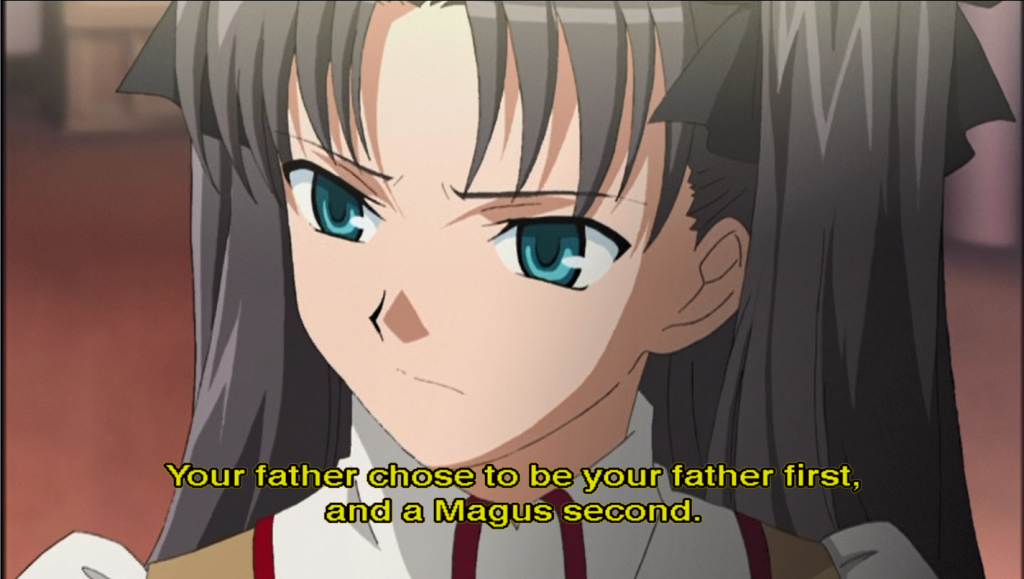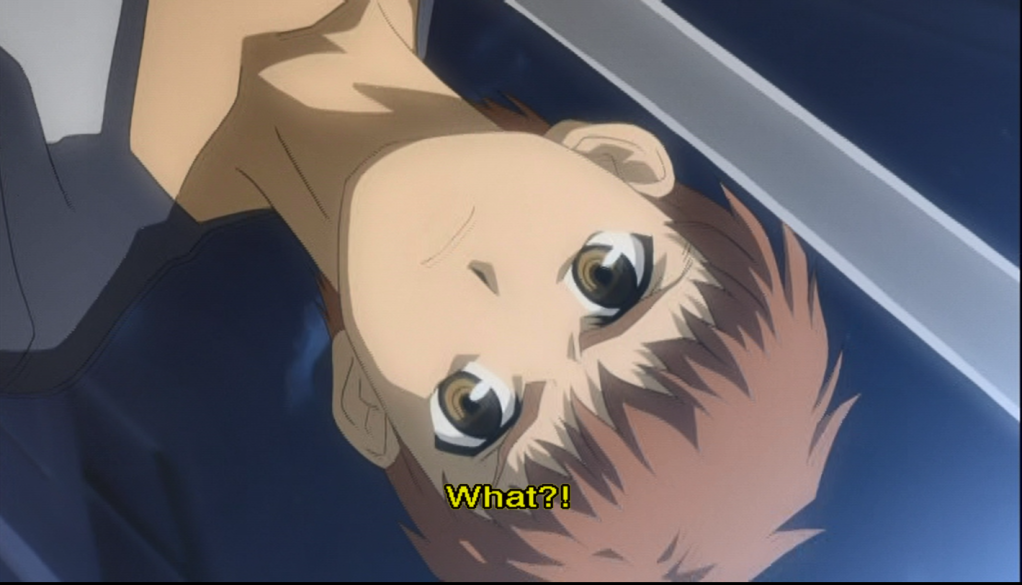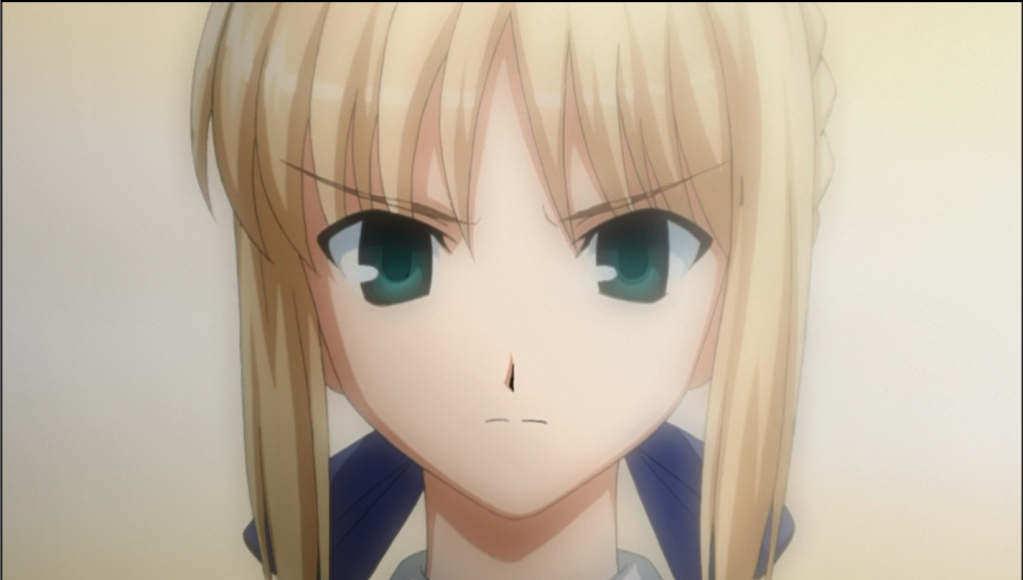Adaptations are a complex art.
Any adaptation is a series of choices. What should be included? What shouldn’t be? What should be changed? How can the adapters capture the spirit of the original?
Then there are the expectations from the fans. Most people won’t enjoy a panel-by-panel remake of a manga with no animation. For example, look at complaints around Way of the Househusband.
But if you take too many liberties or don’t include enough, the fans will throw a fit in the opposite direction. It’s the kind of problem that can haunt a show (or a franchise) for decades.
Today, I want to talk about one such show — 2006’s Fate/Stay Night.

It’s hard to talk about the Studio Deen production headed by Yuji Yamaguchi without someone bringing up that the visual novel is so much better. It happens often enough that my contrarian tendencies start to flare up.
I mean, how good can a story about a bunch of teenagers summoning cardboard cutouts of historical/mythological figures be? People act like Studio Deen and, later, ufotable burned the complete works of Shakespeare as they were making their adaptation.
As much as I hate bringing up the original visual novel as I talk about Deen/Stay Night, I feel it’s necessary. In fact, it may be the most significant millstone hanging around the neck of this effort. Well, outside a clumsy script, a novice director and an evident lack of vision.
But, first, I have to mention that I watched this show as part of #anitwitwatches, a group watch effort led by Jon Spencer Reviews. Each Monday, a group of us watch some episodes of a show and then tweet about them. It’s a fun way to watch shows.
Now that the plug is out of the way. Let’s talk about Fate/Stay Night (2006).
The Problem with Adaptations
My knowledge of the Fate/Stay Night franchise is relatively limited. Outside of watching this show and Fate/Zero, I’m relying on Wikipedia to fill in the basic shape of what happens in the visual novel.
Adaptations provide a unique puzzle for creators that are trying to cross mediums. Just to use an example, let’s take Alan Moore’s Watchmen. For the people who haven’t read Watchmen, I would best describe it as a nearly plotless examination of characters who exist in a world where superheroes are real and, for the most part, American. While it’s good, it is also the type of story that would work in a book and maybe a television show, but not a movie.

Why is that? Well, movies are, in general, driven by their plot. You simply can’t waste half an hour to tell the tale of an in-story comic book that isn’t important to the plot. You certainly can’t introduce a surprise alien life form two-thirds through the story and expect it to gel together.
To make Watchmen work, you need to make some pretty drastic cuts and changes.
Of course, that is what Zack Snyder did. He cut away all of the extra stuff that was not immediately necessary to the story, and he did what I thought was impossible. He made a decent adaptation of Watchmen that could appeal to a broad audience who never read it.
And vast swaths of the fan community hated it. They hated it because he left stuff out. They hated what he changed.
That’s the problem with adaptations at its heart. They have to serve two audiences. The old audience that loves the original version and doesn’t want to see significant changes, and a new audience who doesn’t care about the original version and desires a good story.

This is the biggest problem facing Deen/Stay Night. It’s really trying to serve both audiences and not doing a great job at serving either.
While I don’t have the background to say this with complete certainty, the way character storylines are shoehorned into a small block of episodes feels like fanservice. The problem is that most of these storylines are not given the proper time to breathe. Illya waffles between being a psychopath and a child with zero explanation. While not bad in and of itself, the Caster storyline got only a brief amount of setup. The Rider storyline has a decent setup, then bizarrely gets cut in half to introduce other plot elements.
None of this is helped by the second problem with Fate/Stay Night.
It’s direction.
The Hyperactive Direction
I rarely complain about direction. The fact is that the most pedestrian directors usually can construct a scene, so it conveys the message it needs to for the story. They typically have the restraint to understand when to shift cameras or change angles.
And don’t get me wrong, directing is not easy. It’s more than just picking out the correct shots, combined with getting the best line deliveries and making sure it all fits together.
So when I say the direction is Deen/Stay Night is terrible, I’m saying it with all due respect for the director and his staff. I’m sure he tried to make a good show.
In all fairness, it’s not just that the direction is awful that is a problem. It’s how it is awful that is the issue.
The perfect example comes during episode 3 as Emiya is introduced to the Holy Grail War by Kirei and Rin. As we are introduced to the scene, the director is obviously trying to generate dread and unease. We have Dutch angles as we approach the church and while they’re in the church. The music is a soft drone. Everything about the scene is telling us we should be unsettled.

Everything is telling us this, except for the editing. Within the first minute of the conversation, there are 15 cuts. Some of them only last a few seconds, and the camera pans if they last longer than that. So not only are you getting a constant feeling of motion from the camera jumps, but the camera hardly ever stands still.
This is the kind of editing I would expect from Dragonball Z.
Just for context, there is a similar scene with Kirei at the beginning of episode 1 talking with Rin’s father and Kirei’s father (I believe). There are seven cuts in the first minute of the scene, including one shot that is nearly 30 seconds. This scene is successful in generating the correct amount of dread.
The Deen version is just distracting.
It’s certainly not the only time the director seems to get in his own way while telling the story. This show was produced in the early days of using computer animation in anime, and someone figured out how to make digital lighting effects. Sometimes they are used well, like the introduction of Saber, and sometimes they just feel slapped on for no real gain.
It just feels amateur.
This also extends to the planning of the series. One of its biggest goofs is introducing an arc about how someone planned to sacrifice everyone in the school to power up their servants. As it’s building up tension, suddenly the show takes a three-episode break for no reason I can tell. It wasn’t necessary.
So I’ve spent a lot of time bagging on Deen/Stay Night, so the next part may come as a bit of a surprise.
Fate/Stay Night (2006) can be pretty good.
Where It Succeeds
While so much of Deen/Stay Night is a mess, there is just as much that isn’t. For example, the final five episodes of the show work. We get to see the growing conflict between what Emiya and Saber want and what their conscience wants them to do.
In fact, I’ll take this one step further. The relationship between Emiya and Saber is the best part of this show. Emiya starts off committed to an ideal of justice that is naive and self-sacrificing to the extreme. On the other hand, Saber is as committed to justice, but it’s measured by more pragmatism.

Seeing them bounce off each other and the occasional moments of comedy is its main attraction.
When we reached the end of the show, it felt earned.
While Saber’s and Emiya’s relationship is by far the best, it’s not the only good set of interactions. Emiya’s conversations with Rin and Archer are also compelling, as is the relationship between Caster and her “master.”
There are conversations between these characters that I will think about for a long time to come.
I don’t have the same feelings about other relationships in the show, which all felt too abbreviated.
It’s probably for the show’s benefit that the best relationship in the show is the one that is highlighted at the end.
Where to Rank It?
For the past year or so, I’ve been ranking the shows we’ve watched for #anitwitwatches. I will be honest, Deen/Stay Night gave me a small amount of trouble figuring out where to place it on the list.
So I have a line in my rankings that falls right below Girls’ Last Tour and right about SSSS. Gridman. Above that line are shows that I think are pretty much OK. They don’t have significant structural problems. They don’t make choices that, at least in my opinion, hurt the characters, theme or plot of the show.
The second part of the list, either by choice or mistake, has programs that just don’t work in some way. I generally use two criteria to order this section of the list — How big intentional is the problem, and how much did I enjoy the show?
To be honest, I’m more forgiving of shows like Gridman or School Days that try something different but fail than I am of shows that are just plain sloppy, like From the New World. While I think few of the directorial choices in Fate/Stay Night (2006) actually pay off, I respect that he was trying to be different.
And I mostly enjoyed it. Not as much as I enjoyed Gridman, but more than I enjoyed the final episodes of School Days.
So here is my list of shows that I have watched as part of #anitwitwatches:
RahXephon
Astra Lost in Space
Another
Wandering Son
Rolling Girls
Girls’ Last Tour
SSSS. Gridman
Fate/Stay Night (2006)
School Days
From the New World
The Perfect Insider
Kanon
Just a note: This doesn’t include the movies that have been featured or the first two series.
Anyway, what do you think of Deen/Stay Night?
Thanks for reading.



It was better then anticipated and a nice place to start, but had I gone backwards? Probably would have had a harder time getting into this one. Not in a way I’d have hated it, but you know what I mean.
I think Fate/Zero was definitely better to watch after I had watched Deen/Stay Night. It filled in a lot of the holes.
Yeah, that makes sense. I’m enjoying that as I make my way through it.
I haven’t watched the original but I have watched Fate/Zero and Prisma Illya. The story is all about a bunch of people summoning servants in order to be victorious to get the Holy Grail to grant whatever wish they want. I guess the appeal of Fate is about the stories surrounding each character and their motives, philosophies, and whatever it is that they want that drives ’em to get the grail (not to mention it includes a lot of but kicking and fighting). I still prefer Prisma Illya though.
Sure. If you have a McGuffin that can grant any wish in the world, you get to generate conflicts that focus on philosophies. Basically, you can look at why Kirei wants the grail and how that conflicts with what Kiritsugu wants. And what experiences did they have to generate those desires.? Etc.
Deen Stay Night has some charm to it but it is far from the better story told in the VN nor is it as epic as some of the other fate stuff, But still nice.
I agree. Some of it is good. Some of it is bad. But overall, it was good enough.
I’ve not seen Fate though I think I played the game long ago. Had to read this after seeing the “burning complete works of Shakespeare” bit 😂and I liked the whole take on the “balancing act” of adaptations. It’s such a current topic with the long list of bad adaptations in general happening.
Adaptations are an interesting subject. I could probably spend 1,500 words parsing out my feelings about them and people’s reactions to them.
Lol, I am once again reminded I need to finish this lol. Apart from that, I definitely agree with your assessment of adaptations, its a tight rope to walk for any creative team.
I haven’t watched the Deen version of Fate for a long time, but I remember never being able to get past the first three (or four? I forgot) episodes since it felt really dull and slow to me… Something that stands in contrast to any mainline Fate adaptations Ufotable churned out in the years since, which I was able to complete with ease… Even though the Ufo version of UBW was a bit of a letdown as much as I liked Rin.